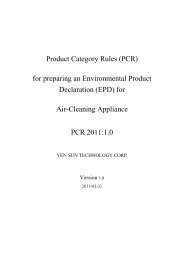for Food Contactable Plastic Containers - GEDnet
for Food Contactable Plastic Containers - GEDnet
for Food Contactable Plastic Containers - GEDnet
Create successful ePaper yourself
Turn your PDF publications into a flip-book with our unique Google optimized e-Paper software.
general rule is that if generic data are used in place of specific data, their combined contribution<br />
<strong>for</strong> all life cycle stages shall not be greater than 20% of total impacts <strong>for</strong> each impact category.<br />
But there may be certain exception to specific products, and such exceptions shall be explained.<br />
- When generic data are used, the equivalence between the chemical and/or physical process, as<br />
well as the technology and system boundaries of the referred generic system with the declared<br />
product system shall be considered. Moreover, it is also recommended to consider the date or<br />
geographic aspects of the data quality when feasible.<br />
- The data shall be representative <strong>for</strong> the average of a specific year. If the average data <strong>for</strong> a<br />
specific year cannot be obtained, the average data <strong>for</strong> a specific time period may be used, the data<br />
shall be representative, and the reason <strong>for</strong> using such data shall be provided.<br />
- The electricity mix <strong>for</strong> the manufacturing stage should be site specific data. If site specific data<br />
cannot be obtained, the official electricity mix <strong>for</strong> the country where the site is located may be<br />
used as approximate value. The electricity mix should be documented.<br />
- For the definition of hazardous waste, the definition as defined in Taiwan’s Waste Disposal Act<br />
shall be used <strong>for</strong> sites located in Taiwan. For sites located outside Taiwan, legal requirements <strong>for</strong><br />
the host country shall be observed.<br />
- For the transportation of main components/constituents to the manufacturing plant, the actual<br />
transportation modes used and distance traveled shall be considered.<br />
Data quality requirements <strong>for</strong> the distribution and marketing stage<br />
- For the transportation of products to the distribution sites or retailer sites, the actual mode of<br />
transportation and distance traveled shall be considered.<br />
Date quality requirements <strong>for</strong> the recycling/waste disposal stage<br />
- For transportation of end-of-life products <strong>for</strong> delivery to the processors/recyclers, the data from<br />
national, industry or consumer surveys can be used. When such data cannot be obtained,<br />
evaluation based on assumed scenario can be made, and the assumptions <strong>for</strong> such a scenario shall<br />
be reported in the EPD.<br />
- If <strong>for</strong> specific reason the site specific data <strong>for</strong> the recycling/waste disposal system cannot be<br />
obtained, generic data and recycling rate may be used to calculate environmental impact. Please<br />
refer to Appendix I <strong>for</strong> the common sources of generic data used internationally.<br />
10. Parameters to be declared in the EPD<br />
The following parameters shall be declared in the EPD:<br />
Energy use<br />
- The energy consumption during each product life cycle stage shall be declared. If the product is<br />
intended <strong>for</strong> end-users, the power consumption during the use stage shall also be declared.<br />
- The following units shall be used preferentially:<br />
kW or W <strong>for</strong> power; J or MJ <strong>for</strong> energy.















